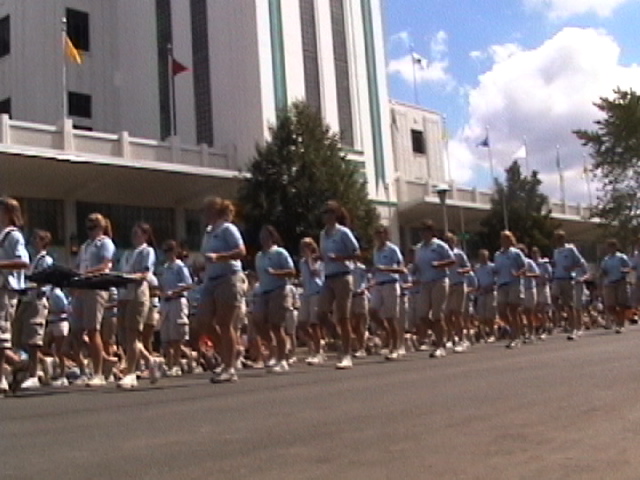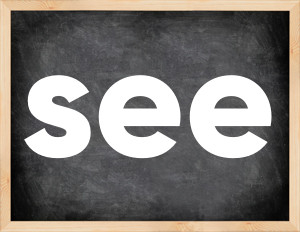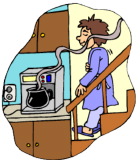Глагол to see – неправильный глагол в английском языке, в переводе на русский означает: увидеть, смотреть, посмотреть, видеть, наблюдать, рассматривать.
| Infinitive | to see |
|---|---|
| Simple past | saw |
| Past participle | seen |
| -s | sees |
| -ing | seeing |
See in present simple
Утверждение
I see
You see
He sees
She sees
It sees
We see
You see
They see
Отрицание
I do not see
You do not see
He does not see
She does not see
It does not see
We do not see
You do not see
They do not see
Вопрос
Do I see?
Do you see?
Does he see?
Does she see?
Does it see?
Do we see?
Do you see?
Do they see?
See in present continuous
Утверждение
I am seeing
You are seeing
He is seeing
She is seeing
It is seeing
We are seeing
You are seeing
They are seeing
Отрицание
I am not seeing
You are not seeing
He is not seeing
She is not seeing
It is not seeing
We are not seeing
You are not seeing
They are not seeing
Вопрос
Am I seeing?
Are you seeing?
Is he seeing?
Is she seeing?
Is it seeing?
Are we seeing?
Are you seeing?
Are they seeing?
See in present perfect
Утверждение
I have seen
You have seen
He has seen
She has seen
It has seen
We have seen
You have seen
They have seen
Отрицание
I have not seen
You have not seen
He has not seen
She has not seen
It has not seen
We have not seen
You have not seen
They have not seen
Вопрос
Have I seen?
Have you seen?
Has he seen?
Has she seen?
Has it seen?
Have we seen?
Have you seen?
Have they seen?
See in present perfect continuous
Утверждение
I have been seeing
You have been seeing
He has been seeing
She has been seeing
It has been seeing
We have been seeing
You have been seeing
They have been seeing
Отрицание
I have not been seeing
You have not been seeing
He has not been seeing
She has not been seeing
It has not been seeing
We have not been seeing
You have not been seeing
They have not been seeing
Вопрос
Have I been seeing?
Have you been seeing?
Has he been seeing?
Has she been seeing?
Has it been seeing?
Have we been seeing?
Have you been seeing?
Have they been seeing?
See in past simple
Утверждение
I saw
You saw
He saw
She saw
It saw
We saw
You saw
They saw
Отрицание
I did not see
You did not see
He did not see
She did not see
It did not see
We did not see
You did not see
They did not see
Вопрос
Did I see?
Did you see?
Did he see?
Did she see?
Did it see?
Did we see?
Did you see?
Did they see?
See in past continuous
Утверждение
I was seeing
You were seeing
He was seeing
She was seeing
It was seeing
We were seeing
You were seeing
They were seeing
Отрицание
I was not seeing
You were not seeing
He was not seeing
She was not seeing
It was not seeing
We were not seeing
You were not seeing
They were not seeing
Вопрос
Was I seeing?
Were you seeing?
Was he seeing?
Was she seeing?
Was it seeing?
Were we seeing?
Were you seeing?
Were they seeing?
See in past perfect
Утверждение
I had seen
You had seen
He had seen
She had seen
It had seen
We had seen
You had seen
They had seen
Отрицание
I had not seen
You had not seen
He had not seen
She had not seen
It had not seen
We had not seen
You had not seen
They had not seen
Вопрос
Had I seen?
Had you seen?
Had he seen?
Had she seen?
Had it seen?
Had we seen?
Had you seen?
Had they seen?
See in past perfect continuous
Утверждение
I had been seeing
You had been seeing
He had been seeing
She had been seeing
It had been seeing
We had been seeing
You had been seeing
They had been seeing
Отрицание
I had not been seeing
You had not been seeing
He had not been seeing
She had not been seeing
It had not been seeing
We had not been seeing
You had not been seeing
They had not been seeing
Вопрос
Had I been seeing?
Had you been seeing?
Had he been seeing?
Had she been seeing?
Had it been seeing?
Had we been seeing?
Had you been seeing?
Had they been seeing?
See in future simple
Утверждение
I will see
You will see
He will see
She will see
It will see
We will see
You will see
They will see
Отрицание
I will not see
You will not see
He will not see
She will not see
It will not see
We will not see
You will not see
They will not see
Вопрос
Will I see?
Will you see?
Will he see?
Will she see?
Will it see?
Will we see?
Will you see?
Will they see?
See in future continuous
Утверждение
I will be seeing
You will be seeing
He will be seeing
She will be seeing
It will be seeing
We will be seeing
You will be seeing
They will be seeing
Отрицание
I will not be seeing
You will not be seeing
He will not be seeing
She will not be seeing
It will not be seeing
We will not be seeing
You will not be seeing
They will not be seeing
Вопрос
Will I be seeing?
Will you be seeing?
Will he be seeing?
Will she be seeing?
Will it be seeing?
Will we be seeing?
Will you be seeing?
Will they be seeing?
See in future perfect
Утверждение
I will have seen
You will have seen
He will have seen
She will have seen
It will have seen
We will have seen
You will have seen
They will have seen
Отрицание
I will not have seen
You will not have seen
He will not have seen
She will not have seen
It will not have seen
We will not have seen
You will not have seen
They will not have seen
Вопрос
Will I haveseen?
Will you haveseen?
Will he haveseen?
Will she haveseen?
Will it haveseen?
Will we haveseen?
Will you haveseen?
Will they haveseen?
See in future perfect continuous
Утверждение
I will have been seeing
You will have been seeing
He will have been seeing
She will have been seeing
It will have been seeing
We will have been seeing
You will have been seeing
They will have been seeing
Отрицание
I will not have been seeing
You will not have been seeing
He will not have been seeing
She will not have been seeing
It will not have been seeing
We will not have been seeing
You will not have been seeing
They will not have been seeing
Вопрос
Will I have been seeing?
Will you have been seeing?
Will he have been seeing?
Will she have been seeing?
Will it have been seeing?
Will we have been seeing?
Will you have been seeing?
Will they have been seeing?
See in conditional present
Утверждение
I would see
You would see
He would see
She would see
It would see
We would see
You would see
They would see
Отрицание
I would not see
You would not see
He would not see
She would not see
It would not see
We would not see
You would not see
They would not see
Вопрос
Would I see?
Would you see?
Would he see?
Would she see?
Would it see?
Would we see?
Would you see?
Would they see?
See in conditional present progressive
Утверждение
I would be seeing
You would be seeing
He would be seeing
She would be seeing
It would be seeing
We would be seeing
You would be seeing
They would be seeing
Отрицание
I would not be seeing
You would not be seeing
He would not be seeing
She would not be seeing
It would not be seeing
We would not be seeing
You would not be seeing
They would not be seeing
Вопрос
Would I be seeing?
Would you be seeing?
Would he be seeing?
Would she be seeing?
Would it be seeing?
Would we be seeing?
Would you be seeing?
Would they be seeing?
See in conditional perfect
Утверждение
I would have seen
You would have seen
He would have seen
She would have seen
It would have seen
We would have seen
You would have seen
They would have seen
Отрицание
I would not have seen
You would not have seen
He would not have seen
She would not have seen
It would not have seen
We would not have seen
You would not have seen
They would not have seen
Вопрос
Would I have seen?
Would you have seen?
Would he have seen?
Would she have seen?
Would it have seen?
Would we have seen?
Would you have seen?
Would they have seen?
See in conditional perfect progressive
Утверждение
I would have been seeing
You would have been seeing
He would have been seeing
She would have been seeing
It would have been seeing
We would have been seeing
You would have been seeing
They would have been seeing
Отрицание
I would not have been seeing
You would not have been seeing
He would not have been seeing
She would not have been seeing
It would not have been seeing
We would not have been seeing
You would not have been seeing
They would not have been seeing
Вопрос
Would I have been seeing?
Would you have been seeing?
Would he have been seeing?
Would she have been seeing?
Would it have been seeing?
Would we have been seeing?
Would you have been seeing?
Would they have been seeing?
нет оценок
- see,
Глагол
saw
/ seen
/ seeing
/ sees
Спряжение глагола see[si:]  видеть, см., увидеть
видеть, см., увидеть
Все формы
IndefiniteContinuousPerfectPerfect ContinuousInfinitivesParticiples
Present Indefinite
I see
you see
he/she/it sees
we see
you see
they see
Present Perfect
I have seen
you have seen
he/she/it has seen
we have seen
you have seen
they have seen
Present Continuous
I am seeing
you are seeing
he/she/it is seeing
we are seeing
you are seeing
they are seeing
Present Perfect Continuous
I have been seeing
you have been seeing
he/she/it has been seeing
we have been seeing
you have been seeing
they have been seeing
Past Indefinite
I saw
you saw
he/she/it saw
we saw
you saw
they saw
Past Continuous
I was seeing
you were seeing
he/she/it was seeing
we were seeing
you were seeing
they were seeing
Past Perfect
I had seen
you had seen
he/she/it had seen
we had seen
you had seen
they had seen
Past Perfect Continuous
I had been seeing
you had been seeing
he/she/it had been seeing
we had been seeing
you had been seeing
they had been seeing
Future Indefinite
I will see
you will see
he/she/it will see
we will see
you will see
they will see
Future Continuous
I will be seeing
you will be seeing
he/she/it will be seeing
we will be seeing
you will be seeing
they will be seeing
Future Perfect
I will have seen
you will have seen
he/she/it will have seen
we will have seen
you will have seen
they will have seen
Future Perfect Continuous
I will have been seeing
you will have been seeing
he/she/it will have been seeing
we will have been seeing
you will have been seeing
they will have been seeing
Conditional Present
I would see
you would see
he/she/it would see
we would see
you would see
they would see
Conditional Present Continuous
I would be seeing
you would be seeing
he/she/it would be seeing
we would be seeing
you would be seeing
they would be seeing
Conditional Perfect
I would have seen
you would have seen
he/she/it would have seen
we would have seen
you would have seen
they would have seen
Conditional Perfect Continuous
I would have been seeing
you would have been seeing
he/she/it would have been seeing
we would have been seeing
you would have been seeing
they would have been seeing
Participles
seen
seeing
Infinitives
to see
to have seen
to be seeing
to have been seeing
The English verb ‘see’ is pronounced as [si:].
Related to:
irregular verbs.
3 forms of verb see: Infinitive (see), Past Simple — (saw), Past Participle — (seen).
Here are the past tense forms of the verb see
👉 Forms of verb see in future and past simple and past participle.
❓ What is the past tense of see.
| Base Form | Past Simple | Past Participle |
|---|---|---|
| see [si:] |
saw [sɔ:] saw [sɔː] |
seen [si:n] |
What are the 2nd and 3rd forms of the verb see?
🎓 What are the past simple, future simple, present perfect, past perfect, and future perfect forms of the base form (infinitive) ‘see‘?
Learn the three forms of the English verb ‘see’
- the first form (V1) is ‘see’ used in present simple and future simple tenses.
- the second form (V2) is ‘saw’,
‘saw’used in past simple tense.
- the third form (V3) is
‘seen’used in present perfect and past perfect tenses.
What are the past tense and past participle of see?
The past tense and past participle of see are:
see in past simple is
saw,
saw,
and past participle is
seen.
What is the past tense of see?
The past tense of the verb «see» is «saw», or
«saw»,
and the past participle is
«seen».
Verb Tenses
Past simple — see in past simple saw,
saw
(V2).
Future simple — see in future simple is see (will + V1).
Present Perfect — see in present perfect tense is
seen
(have/has + V3).
Past Perfect — see in past perfect tense is
seen
(had + V3).
see regular or irregular verb?
👉 Is ‘see’ a regular or irregular verb? The verb ‘see’ is irregular verb.
Examples of Verb see in Sentences
-
Nice to see him and her cleaning the room(Present Simple)
-
After what we saw 2 days ago, do you feel good?(Past Simple)
-
She has seen Brook, and she says he is not angry(Present Perfect)
-
Have you ever seen UFO?(Present Perfect)
-
Better you see your doctor and get professional advice(Present Simple)
-
Did you see that trash bin yesterday?(Past Simple)
-
He will never see me again, I can promise that(Future Simple)
-
My colleagues saw me in the cinema last week when I supposed to be very sick(Past Simple)
-
I’m not seeing that girl, she is my best friend’s sister(Present Continuous)
-
Will you see her next week? Please, remind her about the payment(Future Simple)
Along with see, words are popular
clean
and ring.
Verbs by letter:
r,
d,
u,
c,
m,
p,
b,
w,
h,
a,
e,
g,
s,
q,
j,
l,
t,
f,
o,
n,
k,
i,
v,
y,
z.
Английский глагол see [si:], переводится как: видеть.
Входит в группы:
неправильные глаголы,
глаголы 3-й класс,
глаголы 4-й класс,
глаголы 5-й класс.
3 формы глагола see: Infinitive (see), Past Simple — (saw), Past Participle — (seen).
📚 Глагол see имеет значения: видеть, смотреть, увидеть, посмотреть, наблюдать, рассматривать, понимать, представлять себе, испытывать, сталкиваться, встречаться, узнавать, осматривать.
👉 Формы глагола see в настоящем и прошедшем времени 2-я и 3-я форма.
❓ Как будет see в прошедшем времени past simple.
Три формы глагола see
| Base Form | Past Simple | Past Participle | Перевод |
|---|---|---|---|
| see [si:] |
saw [sɔ:] saw [sɔː] |
seen [si:n] |
видеть |
Как поставить see во 2-ю и 3-ю форму?
🎓 Как поставить глагол see в Past Simple, Future Simple, Present Perfect, Past Perfect, Future Perfect?
👉 Всё очень просто, в этих временах прошедшего, будущего и совершённого времени, в английском используются 2я и 3я форма глагола:
- First form (V1) — see. (Present simple, Future Simple)
- Second form (V2) —
saw,
saw.(Past simple)
- Third form (V3) —
seen.(Present perfect, Past perfect)
Как поставить see в past simple?
Если вы не совсем поняли какую форму для see нужно использовать в прошедшем времени, будет:
see в past simple — saw,
saw.
What is the past tense of see?
The past tense of see is saw or
saw.
The past participle of see is seen.
Временные формы глагола — Verb Tenses
Past simple — see в past simple, будет saw,
saw.
(V2)
Future simple — see в future simple будет see. (will + V1)
Present Perfect — see в present perfect будет
seen.
(havehas + V3)
Past Perfect — see в past perfect будет
seen.
(had + V3)
Правильный или неправильный глагол see?
👉 Правильный это глагол ли нет? Глагол see это неправильный глагол.
Примеры применения глагола see
-
Nice to see him and her cleaning the room — Приятно видеть его и ее убирающимися в комнате.
(Present Simple) -
After what we saw 2 days ago, do you feel good? — После того, что мы видели вчера, вы чувствуете себя хорошо?
(Past Simple) -
She has seen Brook, and she says he is not angry — Она видела Брука, и говорит, что он не сердится.
(Present Perfect) -
Have you ever seen UFO? — Ты когда нибудь видел НЛО?
(Present Perfect) -
Better you see your doctor and get professional advice — Лучше тебе пойти к врачу и получить профессиональный совет.
(Present Simple) -
Did you see that trash bin yesterday? — Ты видел это мусорное ведро вчера?
(Past Simple) -
He will never see me again, I can promise that — Он никогда не увидит меня снова, это я могу пообещать.
(Future Simple) -
My colleagues saw me in the cinema last week when I supposed to be very sick — Мои коллеги видели меня в кино на прошлой неделе, когда я должен быть очень больным.
(Past Simple) -
I’m not seeing that girl, she is my best friend’s sister — Я не встречаюсь с той девушкой, она сестра моего лучшего друга.
(Present Continuous) -
Will you see her next week? Please, remind her about the payment — Ты увидишь ее на следующей неделе? Пожалуйста, напомни ей о платеже.
(Future Simple)
Вместе с see, часто смотрят глаголы
stay
and learn.
Глаголы на букву:
r,
d,
u,
c,
m,
p,
b,
w,
h,
a,
e,
g,
s,
q,
j,
l,
t,
f,
o,
n,
k,
i,
v,
y,
z.
Перевод see с английского на русский
- видеть (смотреть, посмотреть, увидеть, наблюдать, увидать)
- понимать (узнать, понять)
- считать (рассматривать)
- встречаться (увидеться)
- повидать (видать)
- замечать
Примеры
- see dead bodies (видеть трупы)
- also see (также видеть)
- see below (смотреть ниже)
- see photos (посмотреть фото)
- see the light (увидеть свет)
- see a situation (наблюдать ситуацию)
- see a joke (понимать шутки)
- see the time (узнать время)
- see the difference (понять разницу)
- see fit (считать целесообразным)
- see things (рассматривать вещи)
- see again (увидеться снова)
- see relatives (повидать родственников)
3 формы глагола с транскрипцией
| Base Form Инфинитив |
Past Simple 2-ая форма |
Past Participle 3-ая форма (Причастие прошедшего времени) |
Gerund Герундий |
|---|---|---|---|
| see | saw | seen | seeing |
| [siː] | [sɔː] | [siːn] | [ˈsiːɪŋ] |
| [siː] | [ˈsɔː] | [ˈsiːn] | [ˈsiːɪŋ] |
Тренажёр спряжения для запоминая форм
Настройки
Спряжение see в английском языке во всех временах, лицах и числах
Simple Tense — Простое (неопределенное) время
Present Simple
Простое настоящее
- I see
- you see
- he, she sees
- we see
- you see
- they see
Past Simple
Простое прошедшее
- I saw
- you saw
- he, she saw
- we saw
- you saw
- they saw
Future Simple
Простое будущее
- I will see
- you will see
- he, she will see
- we will see
- you will see
- they will see
Continuous Tense — Длительное время
Present Simple Continuous
Настоящее длительное
- I am seeing
- you are seeing
- he, she is seeing
- we are seeing
- you are seeing
- they are seeing
Past Simple Continuous
Прошедшее длительное
- I was seeing
- you were seeing
- he, she was seeing
- we were seeing
- you were seeing
- they were seeing
Future Simple Continuous
Будущее длительное
- I will be seeing
- you will be seeing
- he, she will be seeing
- we will be seeing
- you will be seeing
- they will be seeing
Perfect Tense — Совершенное время
Present Perfect
Настоящее совершенное
- I have seen
- you have seen
- he, she has seen
- we have seen
- you have seen
- they have seen
Past Perfect
Прошедшее совершенное
- I had seen
- you had seen
- he, she had seen
- we had seen
- you had seen
- they had seen
Future Perfect
Будущее совершенное
- I will have seen
- you will have seen
- he, she will have seen
- we will have seen
- you will have seen
- they will have seen
Perfect Continuous Tense — Длительное совершенное время
Present Perfect Continuous
Настоящее совершенное длительное
- I have been seeing
- you have been seeing
- he, she has been seeing
- we have been seeing
- you have been seeing
- they have been seeing
Past Perfect Continuous
Прошедшее совершенное длительное
- I had been seeing
- you had been seeing
- he, she had been seeing
- we had been seeing
- you had been seeing
- they had been seeing
Future Perfect Continuous
Будущее совершенное длительное
- I will have been seeing
- you will have been seeing
- he, she will have been seeing
- we will have been seeing
- you will have been seeing
- they will have been seeing
Conditional — Условное наклонение
Present
- I would see
- you would see
- he, she would see
- we would see
- you would see
- they would see
Perfect
- I would have seen
- you would have seen
- he, she would have seen
- we would have seen
- you would have seen
- they would have seen
Present Continuous
- I would be seeing
- you would be seeing
- he, she would be seeing
- we would be seeing
- you would be seeing
- they would be seeing
Perfect Continuous
- I would have been seeing
- you would have been seeing
- he, she would have been seeing
- we would have been seeing
- you would have been seeing
- they would have been seeing
Imperative — Повелительное наклонение
Imperative
- you see
- we Let’s see
- you see
Проспрягать другие глаголы
collect, divorce, freeze, discourage, absorb, output, trust, glorify, explain, skip, shop, jeopardize, clarify, import, model, shear, flirt, supply, bake, reel, choose, avoid, brief, retire, suit, forget, dive
Введите инфинитив глагола или личную форму глагола, чтобы увидеть таблицу спряжения для него
X
English
- Английский
- Французский
- Испанский
- Немецкий
- Итальянский
- Португальский
- Иврит
- Русский
- Арабский
- Японский
Проспрягать
Вспомогательный глагол:
have, be
Сокращенные формы
Indicative
Present
- I see
- you see
- he/she/it sees
- we see
- you see
- they see
Preterite
- I saw
- you saw
- he/she/it saw
- we saw
- you saw
- they saw
Present continuous
- I am seeing
- you are seeing
- he/she/it is seeing
- we are seeing
- you are seeing
- they are seeing
Present perfect
- I have seen
- you have seen
- he/she/it has seen
- we have seen
- you have seen
- they have seen
Future
- I will see
- you will see
- he/she/it will see
- we will see
- you will see
- they will see
Future perfect
- I will have seen
- you will have seen
- he/she/it will have seen
- we will have seen
- you will have seen
- they will have seen
Past continous
- I was seeing
- you were seeing
- he/she/it was seeing
- we were seeing
- you were seeing
- they were seeing
Past perfect
- I had seen
- you had seen
- he/she/it had seen
- we had seen
- you had seen
- they had seen
Future continuous
- I will be seeing
- you will be seeing
- he/she/it will be seeing
- we will be seeing
- you will be seeing
- they will be seeing
Present perfect continuous
- I have been seeing
- you have been seeing
- he/she/it has been seeing
- we have been seeing
- you have been seeing
- they have been seeing
Past perfect continuous
- I had been seeing
- you had been seeing
- he/she/it had been seeing
- we had been seeing
- you had been seeing
- they had been seeing
Future perfect continuous
- I will have been seeing
- you will have been seeing
- he/she/it will have been seeing
- we will have been seeing
- you will have been seeing
- they will have been seeing
Participle
Imperative
- see
- let’s see
- see
Perfect participle
- having seen
Спряжение глагола «see» во всех временах, наклонениях и лицах.
Поиск определения и перевода в контексте глагола «see» с примерами его использования в реальном общении.
Похожие английский глаголы: foresee, oversee, sightsee
Lesson Five:
Have or Has + Subject + past participle
|
Singular |
Plural |
|
Have I seen… |
Have we seen… |
|
Have you seen… |
Have you seen… |
|
Has he seen… |
|
|
Has she seen… |
Have they seen… |
|
Has it seen… |
In the example above, the verb “see” is in the present perfect tense. “Seen” is the past participle for the verb “see.”
When you begin a question with “have” or “has,” the answer is usually yes or no.
examples:
|
Have I ever met you? (Your answer: Yes, you have. / No, you haven’t.) |
|
|
Have you lived in the United States long? (Answer: No, I haven’t. / Yes, I have.) |
|
|
Has he had any coffee yet this morning? (Answer: No, he hasn’t.) |
|
|
Has she ridden a bike before? (Answer: Yes, she has.) |
|
|
Has the goat eaten anything yet today? (Answer: No, it hasn’t.) |
|
|
Have we known each other for a long time? (Answer: No, we haven’t. We’ve known each other for a short time.) |
I + you = we |
|
Have you ever traveled to China? (Answer: No, we haven’t.) |
|
|
Have they marched in this parade before? (Answer: No, they haven’t, but they have marched in other parades.) |
 |
Click on the link to see some of the differences between
the past tense and the present perfect tense.
Next: Lesson Six







